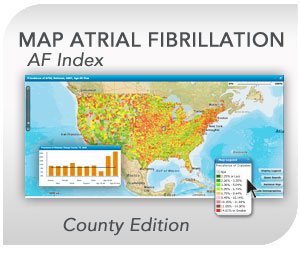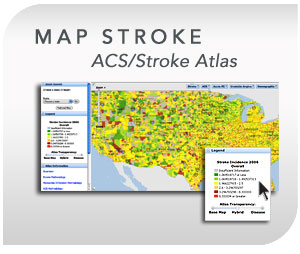Stroke Reports
Friday, March 22nd, 2013

JAMA: March 20, 2013 Importance Long-term data on mortality after first-ever stroke in adults aged 18 through 50 years are scarce and usually restricted to ischemic stroke. Moreover, expected mortality not related to first-ever stroke is not taken in account. Objectives To investigate long-term mortality and cause of death after acute stroke in adults aged […]
Stroke Reports
Friday, March 22nd, 2013

Cardiology News: March 19, 2013 Health care reformers looking to drive down preventable 30-day readmission rates will find slim pickings among the nation’s elderly hospitalized for ischemic stroke, according to Judith H. Lichtman, Ph.D. An analysis of national fee-for-service Medicare data concluded that a mere 1.7% of patients hospitalized for ischemic stroke in 2006 had […]
Stroke Reports
Friday, March 22nd, 2013

STROKEAHA: March 14, 2013 Background and Purpose—Symptomatic intracerebral hemorrhage (sICH) after tissue plasminogen activator for acute ischemic stroke is associated with poor outcome. There are conflicting data on sICH risk related to lipid levels and use of lipid-lowering medications. We evaluated whether there are associations between lipid levels, lipid-lowering medications, and sICH in Get With the […]
Stroke Reports
Friday, March 22nd, 2013

STROKEAHA: March 14, 2013 Background and Purpose—To evaluate cerebral microbleeds (CMBs) and future stroke risk (including intracerebral hemorrhage [ICH]) in patients with ischemic stroke (IS) or transient ischemic attack. Materials and Methods—A systematic review and meta-analysis of prospective cohorts with recent IS/transient ischemic attack. We critically appraised studies and calculated pooled odds ratios (ORs), using the […]
Stroke Reports
Friday, March 22nd, 2013

J NeuroIntervent Surgery: March 14, 2013 The Massachusetts General Hospital Neuroradiology Division employed an experience and evidence based approach to develop a neuroimaging algorithm to best select patients with severe ischemic strokes caused by anterior circulation occlusions (ACOs) for intravenous tissue plasminogen activator and endovascular treatment. Read more
Stroke Reports
Thursday, March 14th, 2013

Wiley: March 12, 2013 Background Race-ethnic differences may influence postthrombolysis outcomes in acute ischemic stroke patients. Guidelines for thrombolytic therapy to treat Asian stroke patients are based mostly on extrapolated western data. Aims We undertook to examine outcomes among Asians by comparing a propensity-matched cohort of thrombolyzed patients from a tertiary center in Singapore with […]
Stroke Reports
Thursday, March 14th, 2013

Wiley: March 12, 2013 Background Atrial fibrillation is associated with greater baseline neurological impairment and worse outcomes following ischemic stroke. Previous studies suggest that greater volumes of more severe baseline hypoperfusion in patients with history of atrial fibrillation may explain this association. We further investigated this association by comparing patients with and without atrial fibrillation […]
Stroke Reports
Thursday, March 14th, 2013

PLOS ONE: March 7, 2013 The burden of stroke is disproportionately high in the South Asian subcontinent with South Asian ethnicity conferring a greater risk of ischemic stroke than European ancestry regardless of country inhabited. While genes associated with stroke in European populations have been investigated, they remain largely unknown in South Asians. We conducted […]
Stroke Reports
Thursday, March 14th, 2013

STROKEAHA: March 7, 2013 Background and Purpose—Sleep-disordered breathing (SDB) represents a risk factor for cardiovascular morbidity after a cerebral ischemic event (acute ischemic event, ischemic stroke, or transient ischemic attack). In the present study, endothelial function and arterial stiffness were analyzed in patients who experienced a postacute ischemic event with relation to SDB, sleep disruption, and […]
Stroke Reports
Thursday, March 14th, 2013

Neurology: February 13, 2013 Objective: CHADS2 and CHA2DS2-VASc scores are used to assess stroke risk in patients with atrial fibrillation (AF). We investigated whether these scores are associated with stroke outcome in non-AF stroke patients. Methods: Consecutive patients with acute first-ever ischemic stroke but without AF were classified into subgroups according to prestroke CHADS2 and CHA2DS2-VASc scores and followed up […]



































